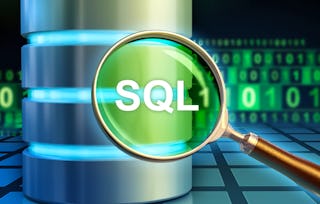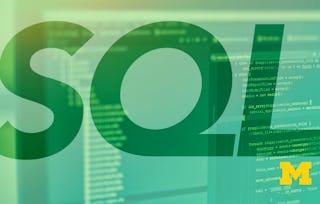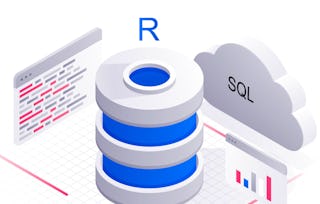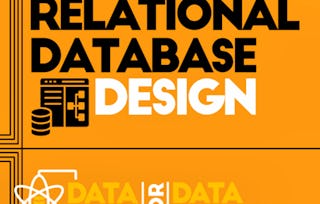In this course you will learn all about the Structured Query Language ("SQL".) We will review the origins of the language and its conceptual foundations. But primarily, we will focus on learning all the standard SQL commands, their syntax, and how to use these commands to conduct analysis of the data within a relational database. Our scope includes not only the SELECT statement for retrieving data and creating analytical reports, but also includes the DDL ("Data Definition Language") and DML ("Data Manipulation Language") commands necessary to create and maintain database objects.

The Structured Query Language (SQL)

The Structured Query Language (SQL)
This course is part of Databases for Data Scientists Specialization

Instructor: Alan Paradise
75,053 already enrolled
Included with
1,117 reviews
Recommended experience
What you'll learn
The origins and historical basis for SQL
Standard SQL use and syntax
How to code SQL queries in order to analyze data stored in relational databases
Skills you'll gain
Details to know

Add to your LinkedIn profile
28 assignments
See how employees at top companies are mastering in-demand skills

Build your subject-matter expertise
- Learn new concepts from industry experts
- Gain a foundational understanding of a subject or tool
- Develop job-relevant skills with hands-on projects
- Earn a shareable career certificate

There are 6 modules in this course
The origins of SQL, what it is and how it works.
What's included
5 videos3 readings3 assignments2 discussion prompts
The SELECT statement - retrieving data from your database.
What's included
5 videos6 readings5 assignments1 discussion prompt1 ungraded lab
The five GROUP functions.
What's included
3 videos4 readings6 assignments
Using the JOIN.
What's included
4 videos4 readings5 assignments1 discussion prompt
SQL Statements: beyond the SELECT.
What's included
4 videos6 readings5 assignments
Some more advanced SQL capabilities.
What's included
5 videos7 readings4 assignments1 peer review1 discussion prompt
Earn a career certificate
Add this credential to your LinkedIn profile, resume, or CV. Share it on social media and in your performance review.
Build toward a degree
This course is part of the following degree program(s) offered by University of Colorado Boulder. If you are admitted and enroll, your completed coursework may count toward your degree learning and your progress can transfer with you.¹
Instructor

Offered by
Explore more from Data Analysis
 Status: Free Trial
Status: Free Trial Status: Free Trial
Status: Free TrialUniversity of Michigan
 Status: Free Trial
Status: Free Trial Status: Free Trial
Status: Free TrialUniversity of Colorado Boulder
Why people choose Coursera for their career

Felipe M.

Jennifer J.

Larry W.

Chaitanya A.
Learner reviews
- 5 stars
79.06%
- 4 stars
15.02%
- 3 stars
2.68%
- 2 stars
1.25%
- 1 star
1.96%
Showing 3 of 1117
Reviewed on Feb 23, 2023
In my opinion, this course is quite suitable for people who are just starting to learn SQL. Complete learning material content even to the history of the SQL language.
Reviewed on Dec 8, 2022
I am impressed with the enthusiasm of the instructor and the way he carried the course through out. Big thumbs up from my side :)
Reviewed on Dec 16, 2024
I felt this is an amazing course for whoever trying to learn or go through the beginner level concepts of SQL with amazing set of practice questions.

Open new doors with Coursera Plus
Unlimited access to 10,000+ world-class courses, hands-on projects, and job-ready certificate programs - all included in your subscription
Advance your career with an online degree
Earn a degree from world-class universities - 100% online
Join over 3,400 global companies that choose Coursera for Business
Upskill your employees to excel in the digital economy
Frequently asked questions
To access the course materials, assignments and to earn a Certificate, you will need to purchase the Certificate experience when you enroll in a course. You can try a Free Trial instead, or apply for Financial Aid. The course may offer 'Full Course, No Certificate' instead. This option lets you see all course materials, submit required assessments, and get a final grade. This also means that you will not be able to purchase a Certificate experience.
When you enroll in the course, you get access to all of the courses in the Specialization, and you earn a certificate when you complete the work. Your electronic Certificate will be added to your Accomplishments page - from there, you can print your Certificate or add it to your LinkedIn profile.
Yes. In select learning programs, you can apply for financial aid or a scholarship if you can’t afford the enrollment fee. If fin aid or scholarship is available for your learning program selection, you’ll find a link to apply on the description page.
More questions
Financial aid available,

